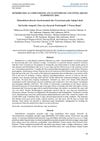 36 citations,
June 2014 in “Experimental Neurology”
36 citations,
June 2014 in “Experimental Neurology” Teriflunomide is an effective and generally safe oral treatment for relapsing MS, reducing relapses and slowing disability progression.
 9 citations,
May 2021 in “Immunological Reviews”
9 citations,
May 2021 in “Immunological Reviews” Different types of fibroblasts play various roles in kidney repair and aging, and may affect chronic kidney disease outcomes.
[object Object]  5 citations,
May 2023 in “Frontiers in immunology”
5 citations,
May 2023 in “Frontiers in immunology” Environmental factors like diet and vitamin levels, especially Vitamin D, can affect autoimmune diseases differently, with lifestyle changes potentially improving outcomes.
 1 citations,
August 2018 in “bioRxiv (Cold Spring Harbor Laboratory)”
1 citations,
August 2018 in “bioRxiv (Cold Spring Harbor Laboratory)” A new mutation in the TMEM173 gene and a risk allele in IFIH1 cause a unique set of immune-related symptoms.
 January 2024 in “Burns and trauma”
January 2024 in “Burns and trauma” The skin microbiome helps heal wounds and can be targeted to improve healing.
 October 2007 in “Journal of Investigative Dermatology”
October 2007 in “Journal of Investigative Dermatology” The document suggests a bacteria plays a significant role in acne rosacea and that white hair can regain color after transplant, meriting more research on reversing grey hair.
 115 citations,
November 2015 in “The journal of allergy and clinical immunology/Journal of allergy and clinical immunology/The journal of allergy and clinical immunology”
115 citations,
November 2015 in “The journal of allergy and clinical immunology/Journal of allergy and clinical immunology/The journal of allergy and clinical immunology” Children with atopic dermatitis often have sleep problems, affecting their growth and behavior.
 113 citations,
July 2020 in “Communications biology”
113 citations,
July 2020 in “Communications biology” Men, especially older ones with health issues like prostate cancer, may have worse COVID-19 outcomes and could benefit from therapies targeting male hormones.
 75 citations,
August 2018 in “Biochemical pharmacology”
75 citations,
August 2018 in “Biochemical pharmacology” Targeting the skin's endocannabinoid system could help treat skin disorders.
 70 citations,
October 2020 in “The journal of allergy and clinical immunology/Journal of allergy and clinical immunology/The journal of allergy and clinical immunology”
70 citations,
October 2020 in “The journal of allergy and clinical immunology/Journal of allergy and clinical immunology/The journal of allergy and clinical immunology” Janus kinase inhibitors are promising drugs for treating autoimmune and inflammatory diseases.
[object Object]  47 citations,
December 2019 in “Frontiers in immunology”
47 citations,
December 2019 in “Frontiers in immunology” A new mutation in the STING protein causes a range of symptoms and its severity may be affected by other genetic variations; treatment with a specific inhibitor showed improvement in one patient.
 44 citations,
November 2009 in “Archives of Dermatology”
44 citations,
November 2009 in “Archives of Dermatology” CYLD mutations cause a variety of skin tumors with symptoms starting around age 16, and treatments are currently limited.
 39 citations,
April 2011 in “Recent Patents on Drug Delivery & Formulation”
39 citations,
April 2011 in “Recent Patents on Drug Delivery & Formulation” Nanoemulsion-based drug delivery systems are versatile and have potential for treating various medical conditions and improving vaccines.
 16 citations,
January 2021 in “Dermatology and therapy”
16 citations,
January 2021 in “Dermatology and therapy” An imbalance in gut bacteria is linked to skin immune diseases and may affect their outcomes and related health issues.
 13 citations,
July 2001 in “International Journal of Dermatology”
13 citations,
July 2001 in “International Journal of Dermatology” Inflammation and Demodex mites might contribute to hair loss, and targeting them could help treat it.
 11 citations,
July 2014 in “Gene”
11 citations,
July 2014 in “Gene” The S250C variant in a gene may cause autoimmunity and immunodeficiency by impairing protein function.
 7 citations,
December 2020 in “Clinics in Dermatology”
7 citations,
December 2020 in “Clinics in Dermatology” Some alopecia treatments might help treat COVID-19, but more research is needed.
 6 citations,
August 2020 in “Dermatology and Therapy”
6 citations,
August 2020 in “Dermatology and Therapy” People with Alopecia Areata often have lower vitamin D levels, and vitamin D supplements might help treat it.
 4 citations,
March 2009 in “British Journal of Dermatology”
4 citations,
March 2009 in “British Journal of Dermatology” The conference highlighted new dermatological treatments and emphasized early intervention and addressing conditions lacking evidence-based treatments.
 2 citations,
October 2022 in “International journal of Ayurvedic medicine”
2 citations,
October 2022 in “International journal of Ayurvedic medicine” Licorice has many traditional health benefits, but more research is needed to fully support these claims.
 2 citations,
January 2018 in “Elsevier eBooks”
2 citations,
January 2018 in “Elsevier eBooks” Lipid nanoparticles improve drug delivery through the skin, offering stability, controlled release, and better compatibility with skin.
 January 2024 in “Frontiers in immunology”
January 2024 in “Frontiers in immunology” Histone modification is key in treating chronic inflammatory skin diseases.
 January 2024 in “Jurnal Ilmu Kesehatan Hewan”
January 2024 in “Jurnal Ilmu Kesehatan Hewan” Oreo the dog got better from skin and worm infections after treatment and cleaner living conditions.
 August 2023 in “JOJ dermatology & cosmetics”
August 2023 in “JOJ dermatology & cosmetics” Antibiotics often cause skin reactions, making them a major health concern.
 February 2023 in “Research Square (Research Square)”
February 2023 in “Research Square (Research Square)” Blocking IL-17 can reduce skin inflammation in a mouse model of pityriasis rubra pilaris.
47 citations,
August 2016 in “American Journal Of Pathology” Fibroblast changes in systemic sclerosis may help understand disease severity and treatment.
6 citations,
March 2020 in “Anais Brasileiros de Dermatologia” CTLA4 gene variants are not linked to alopecia areata in Monterrey's Mexican population.
9 citations,
June 2023 in “Cells” Certain natural and synthetic compounds may help treat inflammatory skin diseases by targeting a specific signaling pathway.
353 citations,
July 2015 in “Molecular immunology” Porcine skin is very similar to human skin, making it a useful model for research.
54 citations,
September 2012 in “The journal of investigative dermatology/Journal of investigative dermatology” Vitamin A affects hair loss and immune response in alopecia areata.

























